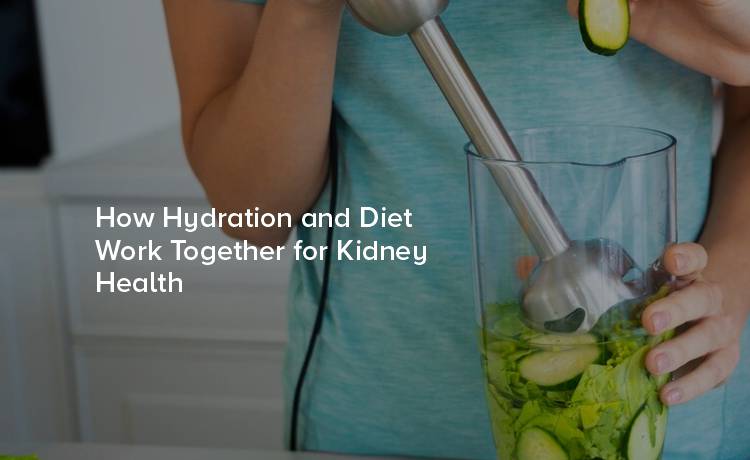
Your kidneys play a crucial role in maintaining your body's overall health. These small, bean-shaped organs work like high-tech filters, removing waste and excess fluids, balancing electrolytes, and producing hormones that regulate blood pressure. However, maintaining kidney health is not just about luck or genetics—it requires an active commitment to positive lifestyle choices.
Before diving into hydration and diet, it's important to understand the critical functions of your kidneys. Here’s what they do daily for your overall well-being:
Given their importance, it's clear why protecting your kidneys is vital for your overall health.
One of the kidneys' main tasks is to regulate body fluids, making hydration one of the foundational keys to kidney health. Here’s how proper hydration affects your kidneys and reduces risks of complications.
When you’re adequately hydrated, your kidneys have enough water to dilute urine, making it easier to flush out toxins. Concentrated urine, which often results from dehydration, can irritate the urinary tract and lead to issues like kidney stones or infections.
Speaking of kidney stones, inadequate water intake is one of the leading factors behind their formation. When urine is too concentrated, minerals can crystallize and form painful stones. Drinking enough water helps dilute urine and reduces the risk of these dangerous buildups.
Dehydration can seriously stress your kidneys. If you notice dark-colored urine, feelings of thirst, or fatigue, it may be a sign to drink more water. Most adults benefit from consuming 8–10 glasses of water per day, though needs vary based on age, weight, climate, and activity levels.
While hydration lays the groundwork for kidney health, diet builds the sustainable structure. Day-to-day food choices directly influence how well your kidneys function, as they are responsible for filtering the nutrients and byproducts that food introduces into your system.
Potassium plays an important role in balancing electrolytes, regulating blood pressure, and supporting nerve function. However, if you consume too much or your kidneys can’t properly regulate it, potassium levels can spike, potentially leading to heart issues.
Kidney stones can sometimes form due to an imbalance in calcium levels. While many believe avoiding calcium prevents stones, the opposite is true. Adequate calcium intake binds oxalate in your digestive system, reducing its presence in the urine. Low-fat dairy products and fortified plant milk are great sources.
This antioxidant supports immune health and helps reduce inflammation, which can benefit kidney health. Be cautious about high supplementation, though, as excess Vitamin C may convert to oxalate, increasing the risk of kidney stones.
Omega-3s, found in fatty fish like salmon, flaxseeds, and walnuts, help combat inflammation and support kidney function.
To protect your kidneys, it’s crucial to reduce certain items in your diet that may overburden these critical organs.
Excess salt can cause fluid retention and high blood pressure, making it harder for kidneys to function. Aim to keep sodium intake under 2,300 mg per day by avoiding processed foods and opting for fresh ingredients.
While protein is vital for muscle and overall health, too much (especially from animal sources) can overwhelm your kidneys. High-protein diets can produce excessive waste products like urea, which your kidneys have to filter. Consider incorporating plant-based protein sources like beans and lentils.
Foods high in refined sugar and saturated fats can increase your risk of obesity and diabetes, both of which are major contributors to kidney disease. Reduce intake of soda, sweets, and fast food.
Hydration and diet function as a team to maintain your kidney health. Hydration ensures your kidneys can efficiently flush out toxins, while a balanced diet minimizes the toxins and harmful substances entering your system in the first place.
For example, drinking plenty of water helps prevent kidney stones, but choosing foods high in calcium and low in sodium further reinforces that protection. Similarly, staying hydrated amplifies the benefits of eating potassium-rich fruits and vegetables, promoting optimal electrolyte balance.
Develop a habit of starting your day with a glass of water and continue staying hydrated throughout the day.
Focus on fresh, whole foods like fruits, vegetables, lean proteins, and whole grains.
Excessive alcohol puts stress on the kidneys; consume it sparingly.
High blood pressure and diabetes are leading causes of kidney issues.
Regular exercise improves circulation and overall kidney function.
Your kidneys work tirelessly to keep your body balanced, healthy, and functioning optimally. By staying hydrated and committing to a kidney-friendly diet, you can help prevent future complications and empower your health for the long run.